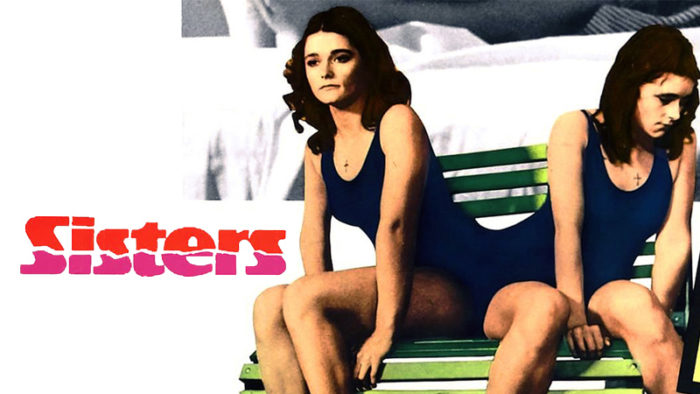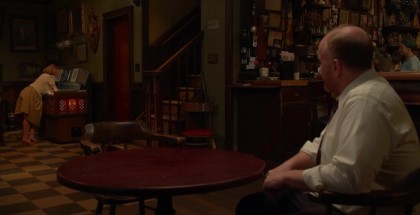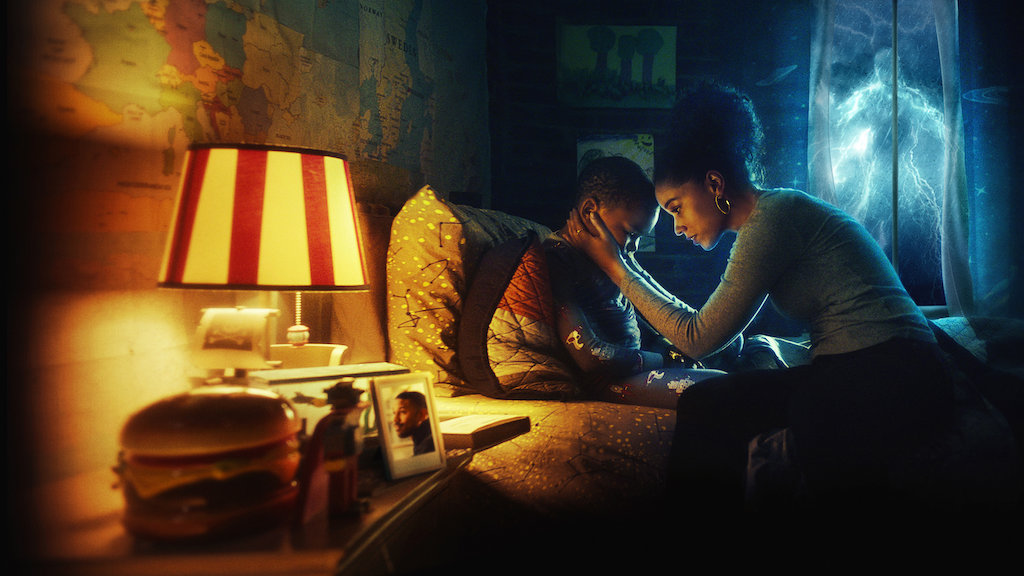VOD film review: Sisters (1972)

Review Overview
Heightened craft
9Crazy tension
9Margot Kidder and Margot Kidder
9Rating
Anton Bitel | On 24, Jan 2020
Director: Brian De Palma
Cast: Margot Kidder, Jennifer Salt, William Finley, Charles Durning, Lisle Wilson, Barnard Hughes, Mary Davenport, Dolph Sweet
Certificate: 15
Watch Sisters (1972) online in the UK: Shudder UK / MUBI UK / Apple TV (iTunes) / Prime Video (Buy/Rent)
Sisters opens with a double-bluff. First, as the credits roll to the instantly recognisable dramatic strains of a Bernard Herrmann score, we see up-close stills (courtesy of Lennart Nilsson) of a foetus developing in utero, before it is revealed that there is a second foetus hidden behind the first. Next, in the opening scene, ad man Phillip Woode (Lisle Wilson) is shown in a changing room watching as a blind woman enters and starts undressing – only for it to be revealed that this is a sting operation, with Phillip’s moves and moral choices being filmed by hidden cameras for a television show called Peeping Toms. By turning away, Phillip passes the test of chivalry, and is rewarded with dinner for two at Manhattan’s nightspot. The ‘blind’ woman – in fact, a perfectly sighted Quebecoise model called Danielle (Margot Kidder) – puts herself forward to join Phillip at the club, and then invites him back to her apartment on Staten Island. The following morning, Phillip is murdered there, stabbed with a knife from the cutlery set that had been Danielle’s prize on the show.
These two openings, one short and one much longer, introduce what will prove key themes in Brian De Palma’s first thriller: twins (and other doubles), and voyeurism. It turns out that sweet Danielle is a Siamese twin, surgically separated from her more disturbed sister Dominique (also Kidder) as an adult, and still bearing scars (both physical and psychological) from that traumatic rupture. Linked by their otherness – he is African-American, she is French-Canadian – Phillip and Danielle are brought together by a television show devoted to wandering eyes, and as they spend the night and morning together, they are still being observed – by Danielle’s ex-husband, Emil Breton (William Finley), who possessively stalks the model, by Dominique, who lingers jealously in the next room, and by budding journalist Grace Collier (Jennifer Salt), who lives in an apartment opposite and is partial eyewitness to Phillip’s murder. Even the newspaper for which Collier currently works is called the Staten Island Panorama – that last word signifying the full view of the film’s plotting which, in the end, the audience can see even if the surviving characters remain blind.
It is no coincidence that Herrmann was hired to provide the score. For Sisters, like so many of De Palma’s subsequent films, pays homage to, even makes pastiche of, the thrillers of Alfred Hitchcock. Grace snooping from her apartment replays Rear Window (1954), while the killing and cover-up that unfold in Danielle’s apartment come with echoes of Rope (1948) and a gender-reversed Psycho (1960). If these allusions represent one kind of doubling, there are certainly others, from De Palma’s expert use of split screens to divide the film’s narrative perspective in two to the convergence of Danielle’s and Grace’s storylines until they become hypnotically conjoined. Sisters is a film of two halves, with Phillip’s murder and disappearance followed fast by Grace’s amateur sleuthing – in which she is paired with professional detective Joseph Larch (Charles Durning). Their two-pronged investigation will lead to some crazy places, and indeed to a place for the crazy, where one man’s gaslighting ways are made to coalesce with a psychiatrist’s clinical use of mesmerism, and two very different women will find themselves trapped in the same Shock Corridor.
Both Grace and Danielle are trapped. Grace may have high ambitions to pursue her career as an investigative reporter independent of any men, but voices around her, like the urgings of her mother (Mary Davenport) that she give up her “little job” and get married, keep driving her to conform to the prevailing, male-oriented system, while the policemen and Detective Larch broadly patronise and ignore her. In a different way, Danielle is even more trapped, still mentally conjoined to her now-separate sister as though she were a phantom limb, and caught in her ex’s abusive web of control. The two murders in the film are both presented as acts of revenge – one tragically misdirected – against patriarchy itself. Indeed, both begin with castrating slashes at the male groin, the seat of phallocentric power. Yet, by the end of the film, Grace has thoroughly internalised a male voice that undermines her own best interests – and prevents her from ever being able to publish her big journalistic scoop. For this is a film where sisters, and the sisterhood, are shown to fail in their bid for success or freedom, all thanks to a domineering, manipulative Svengali who gets into their heads and brainwashes them to meekness, madness and murder.
“There’s nothing simple about any of this,” complains perplexed police detective Kelly (Dolph Sweet) near the close of Sisters, unable to comprehend how or why the once determined and dogged Grace is now “just not quite herself” and insists that no crime has even been committed. Perhaps the reason is that the real criminal here, patriarchy, is able, not unlike Danielle’s twin, to continue exerting a malign influence long after it has been cut out of the scene. In any case, De Palma’s brassy, bonkers film will have you seeing double.
Sisters (1972) is available to stream online on Shudder UK, as part of a £4.99 monthly subscription, or £49.99 yearly membership. It is also available on MBUI UK, as part of a £9.99 monthly subscription.
Where can I buy or rent Sisters (1972) online in the UK?
Related Posts
Louis C.K.’s Horace and Pete review: Episode 10... April 11, 2016 | Craig Skinner

Why Raising Dion should be your next box set... November 6, 2019 | David Farnor

VOD film review: River July 20, 2016 | Anton Bitel

Why Jed Mercurio’s Critical should be your next box set... March 8, 2015 | David Farnor


















